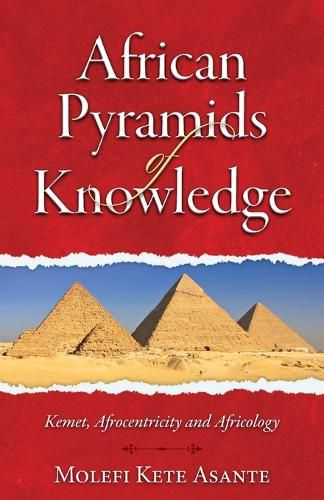Readings Newsletter
Become a Readings Member to make your shopping experience even easier.
Sign in or sign up for free!
You’re not far away from qualifying for FREE standard shipping within Australia
You’ve qualified for FREE standard shipping within Australia
The cart is loading…






This title is printed to order. This book may have been self-published. If so, we cannot guarantee the quality of the content. In the main most books will have gone through the editing process however some may not. We therefore suggest that you be aware of this before ordering this book. If in doubt check either the author or publisher’s details as we are unable to accept any returns unless they are faulty. Please contact us if you have any questions.
Afrocentricity allows the student of human culture investigating African phenomena to view the world from the standpoint of the African. As Ama Mazama has argued in The Afrocentric Paradigm, Afrocentricity’s implications are multifarious and constant. Since the publication of Mazama’s book two decades ago (and spurred in turn by Dr. Asante’s Afrocentricity: The Theory of Social Change two decades before that), the theoretical and critical works on Afrocentricity have exploded. Dr, Asante’s current book brings us into the 21st century with new avenues for research and critique.
Readers will learn how to:
Apply the Afrocentric method to transform human reality
Usher in a human openness to cultural pluralism unlocking of our minds for acceptance of an expansion of consciousness
Overthrow parochialism, provincialism, and narrow Wotanic visions
Demonstrate the usefulness of an Afrocentric approach, beginning with ancient Kemet, to questions of knowledge
African Pyramids of Knowledge delves into four areas: (1) The Intellectual Landscape, which details what constitutes the discipline of Africology, (2) A Mobilization of Ideas, which discusses the hallmarks of creative and philosophical origin as they aid in the critical process of African recovery (3) Confronting the Historical Situation, which proposes new ways to deal with the historical situation and (4) Asserting the New Cultural Reality, envisioning what innovative examination of agency could accomplish.
$9.00 standard shipping within Australia
FREE standard shipping within Australia for orders over $100.00
Express & International shipping calculated at checkout
This title is printed to order. This book may have been self-published. If so, we cannot guarantee the quality of the content. In the main most books will have gone through the editing process however some may not. We therefore suggest that you be aware of this before ordering this book. If in doubt check either the author or publisher’s details as we are unable to accept any returns unless they are faulty. Please contact us if you have any questions.
Afrocentricity allows the student of human culture investigating African phenomena to view the world from the standpoint of the African. As Ama Mazama has argued in The Afrocentric Paradigm, Afrocentricity’s implications are multifarious and constant. Since the publication of Mazama’s book two decades ago (and spurred in turn by Dr. Asante’s Afrocentricity: The Theory of Social Change two decades before that), the theoretical and critical works on Afrocentricity have exploded. Dr, Asante’s current book brings us into the 21st century with new avenues for research and critique.
Readers will learn how to:
Apply the Afrocentric method to transform human reality
Usher in a human openness to cultural pluralism unlocking of our minds for acceptance of an expansion of consciousness
Overthrow parochialism, provincialism, and narrow Wotanic visions
Demonstrate the usefulness of an Afrocentric approach, beginning with ancient Kemet, to questions of knowledge
African Pyramids of Knowledge delves into four areas: (1) The Intellectual Landscape, which details what constitutes the discipline of Africology, (2) A Mobilization of Ideas, which discusses the hallmarks of creative and philosophical origin as they aid in the critical process of African recovery (3) Confronting the Historical Situation, which proposes new ways to deal with the historical situation and (4) Asserting the New Cultural Reality, envisioning what innovative examination of agency could accomplish.